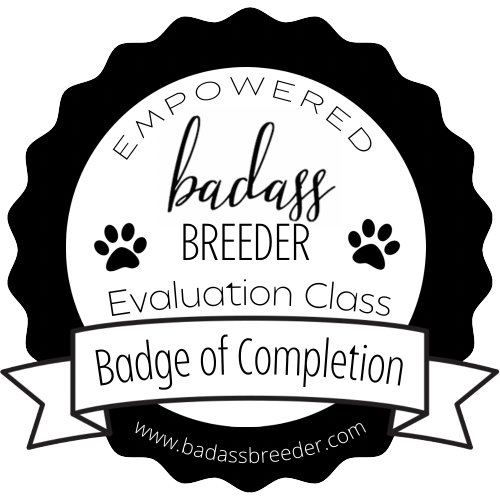Temperament Testing
When puppies are approximately 53 days old, they undergo their temperament tests. We assess each puppy’s level of assertiveness, confidence, motivation, resilience, touch tolerance, energy level, sight and sound sensitivity, prey drive, signs of resource guarding, signs of separation anxiety, and focus ( human, dog, or environment). We video tape these evaluations and share the videos and written reports with those who have a puppy reserved from the litter. We then collaborate with our puppy families to determine which puppies will be the best fit for them.
Temperament Test Terms and Definitions
Assertiveness
This term is often confused with level of aggressiveness but that is not the case. During our evaluations, a puppy with a highly assertive temperament will jump up when they want human attention. They are more likely to do so with familiar humans but they may also do this with strangers as well. While this is thought to be an intrinsic trait, it can be tempered with early and consistent training. A puppy with a low level of assertiveness may have to be coaxed into approaching new people/new situations with an additional amount of guidance from their owners.
Confidence
A confident puppy will approach new situations as an adventure. A puppy with low confidence will need reassurance when approaching new situations until they gain the belief in their own abilities when introduced to new situations. While this trait is similar to assertiveness in description, it is easier to modify with slow introductions to new situations.
Motivation Level/Workability
We look for a puppy with a high level in these areas for service dog prospects because they are easy to train. They may even get bored with no training. They have the intrinsic desire to work for and with a human. If a puppy scores low in this area, they can still be trained but it just takes more work to determine what motivates them.
Nerve Strength/Resiliency
This is the ability to handle stress in reaction to different situations. Puppies who score low in this area can gain nerve strength/resiliency by having ongoing positive experiences in their critical socialization periods.
Touch Tolerance
This is the puppy’s compliance to being touched. We are primarily looking for a strong negative reaction to an accidental ear pull, tail tug, or a foot being stepped on in a public setting or in a home with young children.
Activity Level
This trait is intrinsic and can’t be adjusted. An active puppy isn’t going to suddenly become a lethargic adult. They are going to remain active until they are a geriatric dog. A high activity puppy is going to need extra physical exercise and mental stimulation each day. A puppy who scores a low activity level may not enjoy long hikes or games of fetch.
Sound Sensitivity
This evaluates the level of sensitivity to loud or sudden sounds. A puppy who is sensitive to sounds should go to a quiet home and a puppy who has a high tolerance for sounds would do well in a busy household.
Sight Sensitivity
This evaluates the level to which a puppy is sensitive to sudden movements. As with sound sensitivity, a puppy who is sensitive to sudden/unpredictable sights should go to a quiet/ predictable home. A puppy who isn’t bothered by sudden movements can go to a busy household without concern.
Prey Drive
This is also referred to as chasing instinct. It is the puppy’s natural propensity towards interest in moving objects. This trait is thought to be inheritable ( not necessarily from the parents but from generations past). It isn’t adjustable but it can be managed. When we do the puppy evaluations, puppies with high prey drive will be interested in chasing balls and playing tug of war. However, these puppies may not do well in homes with small/fast moving animals as that may trigger their high level of prey drive. Puppies with low prey drive generally will not enjoy hunting or retrieving.
Human Focus
Natural awareness and desire to interact with people. This trait is intrinsic but can be adjusted by consistent positive interactions with people.
Pack Focus
Desire to interact with others dogs. These are puppies who do well going to a home with an established dog who can act as their mentor.
Tender heartedness
This is often confused with the ability of the puppy to love their humans. It is actually the measure of the puppy’s empathy and awareness of human emotion. A puppy with a high level of emotional sensitivity will feel responsible when surrounded by intense human emotion and constant exposure could drain the puppy. A puppy with a low level of emotional sensitivity will be unaware of intense emotion but will still love and bond with their family. We recommend that puppies with a medium to low level of tender heartedness be ESA prospects.


